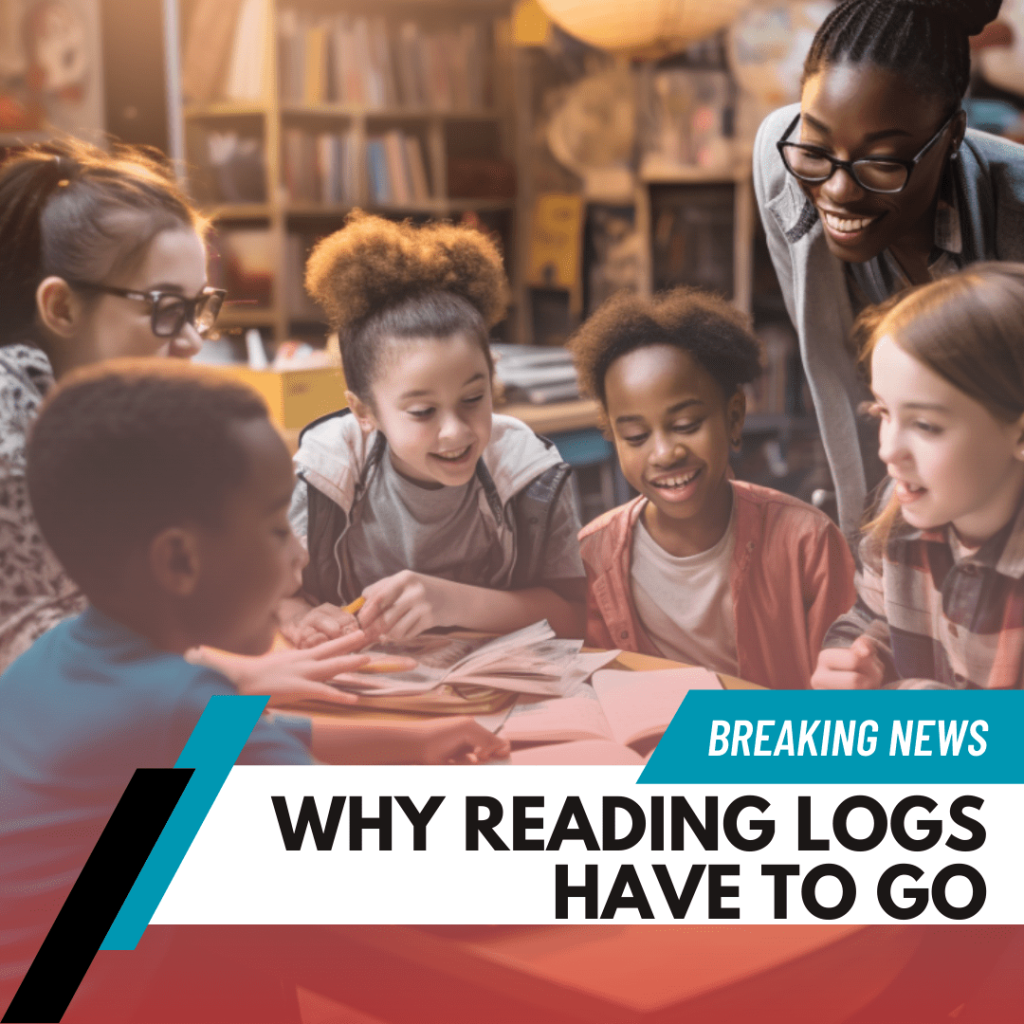“Children should learn that reading is pleasure, not just something that teachers make you do in school.” ~Beverly Cleary
Reading Logs: On the first day of school, I welcome my 8th graders to my English class with a survey about their reading life. I ask them to be extremely honest, so I can gauge where they are as readers, what sorts of books they might like, and how I can best encourage them. Because they are 8th graders, they easily comply with the request for truthiness. While a lot of students said they love to read, many claims that reading is the very last thing they would choose to do if given an hour of free time. In fact, I had one student say he would “rather stare at the wall for the hour of free time than crack open a stupid book.”
Charming.
When prodded, most kids will tell me their love of reading took a dive toward the end of elementary school and into middle school–when their teachers started assigning whole-class books and giving tests and papers over those books. When teachers did give them a choice, it was always in the form of “read what you want at home for X amount of time and fill in this reading log.” I don’t know about you, but as a reader, this is not what I do.
In fact, we do not treat our students as readers; we treat them as if our expectation is that they won’t do it. Why else would we make them prove it with something like a reading log? Donalyn Miller says that “students will rise to the level of the teacher’s expectations” (35). I have found this to be true.
Last fall was my first year at junior high school. While I was shelving my classroom library, another teacher was telling me about how they had tried to let the kids pick their own book to read last year, and it failed. “They just don’t read. But maybe they will for you.”
My expectation is that my students will read. When I tell them this on the first day, many are cynical. They’ve heard this expectation before. Then they were told to do it all on their own and fill out a reading log to prove they did it.
Except I don’t give them a reading log. Instead, I give them the choice of books from my classroom library and our school’s media center, and I give them time in class to read. Instead of asking them to “punch a clock” by filling out a log, I encourage them to check my books out and take them, but I give them time to read. So they do.
Alfie Kohn wrote an article for the English Journal in 2010 about how to create non-readers, and the very first thing on his list was to quantify students’ reading assignments–in other words, tell them how much to read and for how long and to write it all down on a worksheet. This is not how Real Readers read. This is not fun at all. Real, life-long readers don’t set a timer or fill out a sheet every time they read. Real Readers carry a book wherever they go, they grab a chapter here or there. They read while they wait for appointments, classes, or the bus. Mandating a number of pages or a number of minutes puts reading on the same level as a chore–something you have to do, which makes it no longer enjoyable.
Miller also supports this claim, as she wrote in a 2010 letter home to parents that was published on Ed Week, “kids who love reading hate those reading logs. Who wants to curl up at night with your book and your reading log?” Subsequently, those reading logs do nothing to create new avid readers. Without the “motivation” of a log, reluctant readers quit reading altogether. In fact, Kohn’s argument is that the logs actually create non-readers.
But how do you know if they are really reading? I get asked. I talk to my students about their reading. I conference with them. Most of these conferences are not “official”; I don’t call them up to my desk and ask them interview-type questions. Sometimes I do, but usually, I just walk around while they are reading. I pause and ask questions about the book–mostly because I’m interested. Sometimes I want to know what they think of a book I’ve loved. Sometimes I see them reading something I haven’t picked up before. At times, I talk to them on their way into class or if I see them in the hallway.
Each time we read in class, we also respond in a Reader’s Notebook, so I also read and respond to what they write about.
I know my students are reading because they tell me they are. Students who avoid reading are easy to pick out. Those students I spend time talking with about their interests and what they may want to read. They may start and quit ten books, but I know about those books because we talk about them.
Students who read at home do have an advantage over kids who don’t, so of course, I encourage kids to read outside of class. But I believe that getting the right books in their hands will have a far greater rate of success than requiring them to fill out a reading log.








“Each time we read in class, we also respond in a Reader’s Notebook…” This contradicts your entire point.
As a reader myself, A conversation comes naturally. Picture the readers notebook as a place to put your thoughts on what you have read. This is an entirely different thing than just filling out a log with minutes or pages.
Yes! Thank you 🙂
Skipper, I disagree, but I can see why you might think that. Rather than going into detail here, you have just inspired a new post about how Reader’s Notebooks differ from reading logs. Thank you!
One struggle I’ve had is with students who consistently don’t bring a book, or do anything but read during in-class reading time (nap, stare into space, stay on the same page for 15 or 20 minutes). For those who consistently “forget” to bring their book, you can always hand them something to read from the in-class library, but that’s not really much of a choice book, and I’ve found it results in aforementioned fakery during in-class reading time. Another challenge has been with readers who are operating at a much lower level than their peers; they don’t want to be seen reading “a baby book,” as one student memorably called it. Suggestions? Also, how long do you allow for in-class reading time, and how often per week?
All valid questions! I’ve been reading Miller’s “The Book Whisperer,” and have thought of the same concerns! I hope I can receive a notification when these questions are answered!
Hi Anne! I just answered the questions you also had…hopefully you did get a notification 🙂
I really struggled with kids not bringing materials until I started my own classroom library. I followed Donalyn Miller’s and Penny Kittle’s advice to a T and rarely have students who don’t have something to read. My classroom library is filled with novels, but it also has a good number of graphic novels and large “coffee table”- type books for kids who “left their book at home”. I try to have a variety of these so if a kid likes a topic, say my WWII Time “coffee table book”, I can direct them to other WWII historical fiction, graphic novels, or nonfiction.
There are also some high interest “lower” books (the Blueford High series comes to mind) that a number of my students pass around. After reading through many of these, lots of kids will have caught the bug for wanting to read about these same topics and I can guide them to maybe a more challenging book with the same interest.
This is a really good question, and I do still struggle with a few kids who just refuse to read. I put this same question to Kylene Beers recently and look forward to her answer as well.
I usually give my students 15-20 minutes of silent reading 2-3 times a week. They beg for more, but because of our 55-minute classes and all the other things I am required to do, this is really as much time as I can give…for now 😉
While I teach some of our youngest readers (1st grade), I also believe in choice for reading. We build up to about 20 minutes a day for choice reading. I’ll have a good handful of students who choose read-to-self (Daily 5 speak) up to three times a day. That adds up to about an hour of solid reading every day for those little readers. Yes, I have some of the fakers too. I try to deal with that one-on-one by finding books that they enjoy and can read. I’ll read with them for a bit to get started.
I think forcing children to complete reading logs negates the whole point of encouraging our students to be lifelong learners. I have actually worked with people who thought that not only logs are good idea but get this telling students if they don’t like the book they must read 50 pages to determine if they like it! Did this improve test scores: Nope did it make the hour before lunch almost intolerable: YES!!